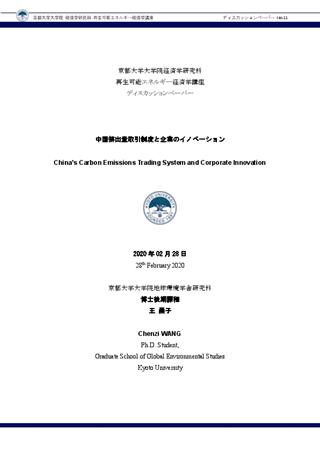TOP > ディスカッションペーパー > No.11 China’s Carbon Emissions Trading System and Corporate Innovation
No.11 China’s Carbon Emissions Trading System and Corporate Innovation
2020年2月28日
京都大学大学院地球環境学舎
博士後期課程 王晨子
 The purpose of this study is to review existing research on carbon emissions trading system and corporate innovation. This study, after referring to the research on European Union carbon emission trading system, Tokyo-Saitama Prefecture emission trading system, and corporate innovation so far, reviewing the relevant literature on China's pilot carbon emission trading system and corporate innovation, found four shortcomings of the existing research. Regarding all previous studies, (1) Either in Europe, Japan, or China, R&D expenditure can be hardly used as indicator of technology innovation to explain whether investment in R&D can help to improve the environment. Regarding research on China's Pilot emission trading system, the author finds that (2) for research based on the data of listed companies, listed companies only account for a small part of the companies participating in China's pilot carbon emissions trading system, and the scale is large, and there is a certain deviation in sample selection, (3) for research based on the questionnaire, the reliability of the data is questionable. Most of the respondents are state-owned companies. Whether to fill in the real data in the face of government pressure is worth exploring, (4) lack of relevant research on the effect of national carbon emissions trading system on corporate innovation. In response to the deficiencies, two topics for future research have also been proposed: (1) Obtaining environmental R&D expenditures and environmental patent data of various companies from the China Association of Environmental Protection Industry. This database includes R&D expenditures and patent data for environmental improvement of 7,085 companies from 2016 to 2018, and includes not only listed companies and state-owned companies but also companies with other operating and management systems. (2) Using the Regression Discontinuity Design (RDD) to study the effect of China's carbon emissions trading system on corporate innovation. It is closer to quasi-natural experiments and the estimated results are more accurate. In addition, the research will focus on the national emission trading market. The results of this study may have reference significance for China's carbon emission trading system and corporate innovation in the future.
The purpose of this study is to review existing research on carbon emissions trading system and corporate innovation. This study, after referring to the research on European Union carbon emission trading system, Tokyo-Saitama Prefecture emission trading system, and corporate innovation so far, reviewing the relevant literature on China's pilot carbon emission trading system and corporate innovation, found four shortcomings of the existing research. Regarding all previous studies, (1) Either in Europe, Japan, or China, R&D expenditure can be hardly used as indicator of technology innovation to explain whether investment in R&D can help to improve the environment. Regarding research on China's Pilot emission trading system, the author finds that (2) for research based on the data of listed companies, listed companies only account for a small part of the companies participating in China's pilot carbon emissions trading system, and the scale is large, and there is a certain deviation in sample selection, (3) for research based on the questionnaire, the reliability of the data is questionable. Most of the respondents are state-owned companies. Whether to fill in the real data in the face of government pressure is worth exploring, (4) lack of relevant research on the effect of national carbon emissions trading system on corporate innovation. In response to the deficiencies, two topics for future research have also been proposed: (1) Obtaining environmental R&D expenditures and environmental patent data of various companies from the China Association of Environmental Protection Industry. This database includes R&D expenditures and patent data for environmental improvement of 7,085 companies from 2016 to 2018, and includes not only listed companies and state-owned companies but also companies with other operating and management systems. (2) Using the Regression Discontinuity Design (RDD) to study the effect of China's carbon emissions trading system on corporate innovation. It is closer to quasi-natural experiments and the estimated results are more accurate. In addition, the research will focus on the national emission trading market. The results of this study may have reference significance for China's carbon emission trading system and corporate innovation in the future.
Keywords:CHN-ETS, EU-ETS, Tokyo-Saitama prefecture ETS, Corporate innovation, Literature review

